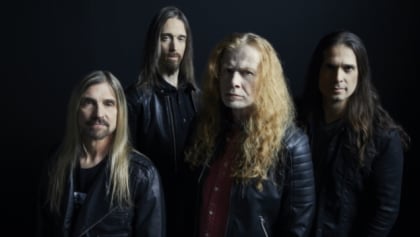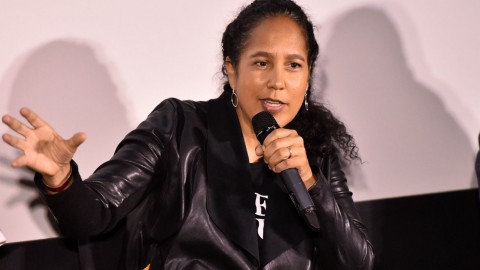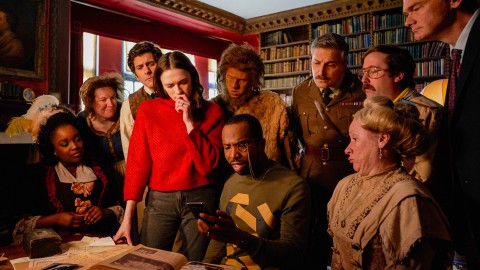
In a world that is spinning frantically out of control, caroline make music that forces you to slow down. The London-based eight-piece, whose self-titled debut album is released this Friday (February 25) on Rough Trade Records, craft patient, meticulously-arranged music that’ll not only slow your heart-rate, but encourage you to listen closely and carefully; a gentle arm around the shoulder to help you lean in closer.
Stately guitars rise and fall over luxurious stretches of time, not unlike the music of Tortoise or Slint, while strings swell and scrape, as woodwind and brass offer delicate texture and dramatic flourishes. It is a sound that seems to have been made for our times, a unique, approachable and uncompromising bolt from the leftfield.
According to vocalist and multi-instrumentalist Jasper Llewellyn, the band’s sound is not something even they have much control over, it just tumbles out that way. “I guess we didn’t really set out with the intention of making any particular sounding music,” he tells NME. “We just played together and improvised, but there was never any plan to make slow music or minimalist-y music.”
caroline’s album arrives at a time when discordant and experimental British guitar music is enjoying a rare moment of semi-mainstream acceptance, following on from the success of bands like Black Country, New Road and black midi, as well as the re-emergence of post-rockers Mogwai, now a chart-topping band. Perhaps it should come as no surprise that at a time of domestic hardship and national political outrage, there is a window for bands offering a cathartic release of anxious tension; caroline certainly fit the bill.
The band formed when Llewellyn and guitarist Casper Hughes, who had become friends when studying together at university in Manchester, moved to London in 2017. They brought in mutual friend Mike O’Malley on guitar and within hours, they found they had locked into a musical bond that was bearing fruit. By the end of their first session, they had written the track ‘Dark Blue’, which now features as the opening track on their album. “That song is very much a snapshot from the first stages of us as a unit,” says O’Malley. “It just happens to be that it was the first thing that we ever did.”
Hughes and Llewellyn had played in bands together in Manchester, although of a very different kind, the former the lead singer and the latter on drums. “I was doing more speaking and shouting kinds of things in those days,” says Hughes. “I guess it was a bit more of a post-punk kind of style.” They were united by a love of the band Ought, but they reflect on it now as having been no more than a phase. “It all changed, thankfully, when Mike joined, and it moved on a bit,” Hughes says.
While the three form the key songwriting core of the band, they are augmented by an assembly of accomplished musicians who each contribute significantly to the band’s output. The result is an aesthetic that manages to be scrupulously controlled while maintaining a sense of scrappy, DIY coarseness, an overall effect that has not happened by accident.
“There are moments of scratchy intensity,” says Hughes, “which come about through having a certain way of playing together in a loose, improvised kind of way. How those sections are placed within the song, though, that is not willy-nilly. It’s all put together in a way that we feel makes sense.”

Even if their music now defies easy categorisation, the band are aware of the influences that have guided them to this point. For Llewellyn and O’Malley, traditional Appalachian folk music has been a constant source of inspiration, while Hughes points towards Midwest emo bands like American Football and Cursive as having fed into the caroline sound.
“When we started playing together as a three, the genre we most associated with what we were doing was post-rock or slowcore,” he says. “Quite early on we all started listening to The Dirty Three as well – that loose, improvised feel and the country, swoon-y violin style, that was quite inspiring. And elements of trance, Lorenzo Senni. People will be like, ‘What?’, but I think it does have an input, even if we’re not making trance bangers. Yet…”
caroline recorded the bulk of their debut album late in 2020, choosing to produce it themselves. O’Malley is the only member of the band with significant production experience, having been at the helm for Girl Ray’s debut album ‘Earl Grey’ in 2017, but the band knew what they wanted from the recording process.
“Having that total control over how and where things are recorded is really important to us,” says O’Malley. We like using different techniques and atmospheres when we record, so having that kind of control was brilliant.”
One such example of the techniques they put to use is the idea of “extreme closeness” on the track ‘IWR’. The guitar parts were recorded as quietly as possible, with the microphone placed within millimetres of the strings and the gain turned up to its maximum capacity. It lends the song a heart-stopping human intimacy, and a sense of drama stemming from the fact that we are hearing every minor imperfection amplified. That same freedom allowed them to record wherever they wanted. Recording spaces ranged from professional studios to the upstairs room in their local pub, to the inside of a swimming pool, all adding to the album’s strange and unpredictable atmospheric depth.
Lyrically, the album is laced with psychological darkness and self-doubt, such as the voice in ‘Good Morning (Red)’ that yells, “Can I be happy in this world / We’ll have to change it, it doesn’t suit us”. Llewellyn denies that the intent is to convey any measure of existential dread. “The mood of the meaning of the phrase has to fit with the music,” he explains. “They are a layer like any of the instrumental parts are a layer, and they bring their own qualities.” That may be true, but it surely speaks to the mood of the music, then, that such brooding lines become so prevalent.
Even in their live performances they cannot help but do something innovative and deeply intimated. The band kicked off 2022 with one of the most unique live shows in recent memory: a five-hour uninterrupted set at London’s Southbank Centre, where friends of the band would join them on stage intermittently and the audience were invited to come and go as they pleased.
As it would transpire, the majority stayed for the duration, a testament to the versatile skills of the musicians. “We just wanted to do something totally different that would push ourselves a little bit,” says Hughes with a smile. It is a sentiment that neatly sums up caroline’s refreshingly disruptive and non-conformist story so far, a story for which even they cannot predict the next chapter.
caroline’s self-titled debut album is due out February 25
Radar Roundup: sign up and get our weekly new music newsletter
The post caroline: art-rock experimentalists building their own unique world appeared first on NME.







